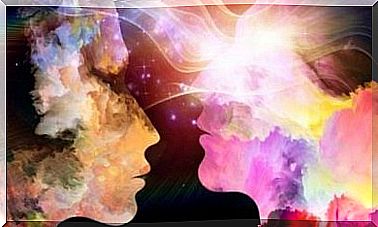When We Neglect Our Emotions

Many people disconnect from their emotions as a kind of defense mechanism. They choose not to feel so they don’t have to suffer. They ‘ freeze’ their hearts to protect their souls from failure, disappointment and the wounds that won’t heal. However, this strategy keeps them from participating in life in a healthy way. Because in this way they neglect their emotions.
Let’s analyze the purpose of our emotions. Every time an emotion is activated in the brain, it triggers a reaction throughout the body. Aversion, for example, distances us from something or someone. Affection, hope and passion, on the other hand, connect us and foster a dynamic in which we can be more energetic and creative.
People who neglect their emotions
People are wrong if they think that negative emotions have no end or that their only purpose is to make us unhappy. In reality, they allow us to adapt, learn and develop in our lives. Anxiety and tension are survival techniques, warning signs that we need to know how to interpret so that we can turn them into adaptive responses that guarantee our survival.
Modern man experiences a lot of fear. Despite the lack of fighters and immediate physical danger, fear in this advanced world is much more profound and complicated.
We are talking about those inner fears and personal demons that paralyze us, suffocate us and have multiple origins. When we are unable to manage them, we quietly choose to disconnect emotionally.

Emotional disconnection: an all-too-common defense mechanism
For now, let’s imagine a fictional person named Miguel. This young man had an emotional past and went through a lot of failures. His level of disappointment is so deep that he enters a new phase in his life where he minimizes the level of emotional involvement and expression. He no longer wants to suffer or be disappointed again.
He is very pleased with the defense mechanism he uses to achieve this goal. He has started with a complex dissociation between his thoughts and his emotions, to the point where he now “intellectualizes” everything that happens. In this way, he is able to justify his emotional isolation at all times by saying things like, ‘ I’m happy when I’m alone. I think love is a waste of time and gets in the way of my professional future.”
Miguel has emotionally disconnected himself to deal with the disappointments of his past, hoping they will never happen again. Here’s the most revealing part, though: Miguel not only builds walls around himself that prevent him from participating in life in a healthy way, but he slowly slips into the same emotional void that he wanted to protect himself from.

What Happens When You Disconnect Yourself Emotionally
If love is suffering for Miguel, closing the door of love often means that this suffering is transported to all other areas of life. Emotional disconnection is a relentless virus that spreads slowly and conquers multiple areas of life. People who experience it no longer register affection as meaningful.
Soon he will be plagued with inexplicable frustration, sharp bitterness, moodiness and emotional distress, which sooner or later will turn into physical pain, insomnia, illness and depression.
Being in touch with your emotions can save your life
At the beginning of this article, we talked about the weight of negative emotions on our lives. We defined them as survival mechanisms, but as we saw in the example above, many of us will drop anchor to throw these emotions into a deep void of indifference. Or from oblivion.
Choosing not to feel so that you don’t have to suffer makes no sense, because no matter what we tell ourselves, humans are not rational beings or robots. We are an accumulation of incredible emotions that guide us through life and give us life to connect with each other, to learn after we fall, to cry our worries away, to laugh with happiness, and to make our heads up after we have overcome the danger.

Neuroscience reminds us that the disconnection that comes from negative emotions is neither helpful nor healthy. Negative emotions like fear and disgust have a purpose, but they are also the cause of what scientists define as ‘homeostatic impulse’, a fancy word for comfort zone. Humans are designed to act, not to be isolated on their islands of discontent.
When your inner balance has been disturbed, it is good to gather your energy, be creative and brave so that you can restore your inner homeostasis. That way you will find emotional satisfaction, that sweet place where nothing hurts and nothing is missing. You will be able to make yourself feel again so that you can first reconnect with yourself and then reconnect with those around you.
In summary, we can say that the brain is an incredible social and emotional organ that needs connections to be okay, at peace and in balance. So let’s take good care of our emotions.









